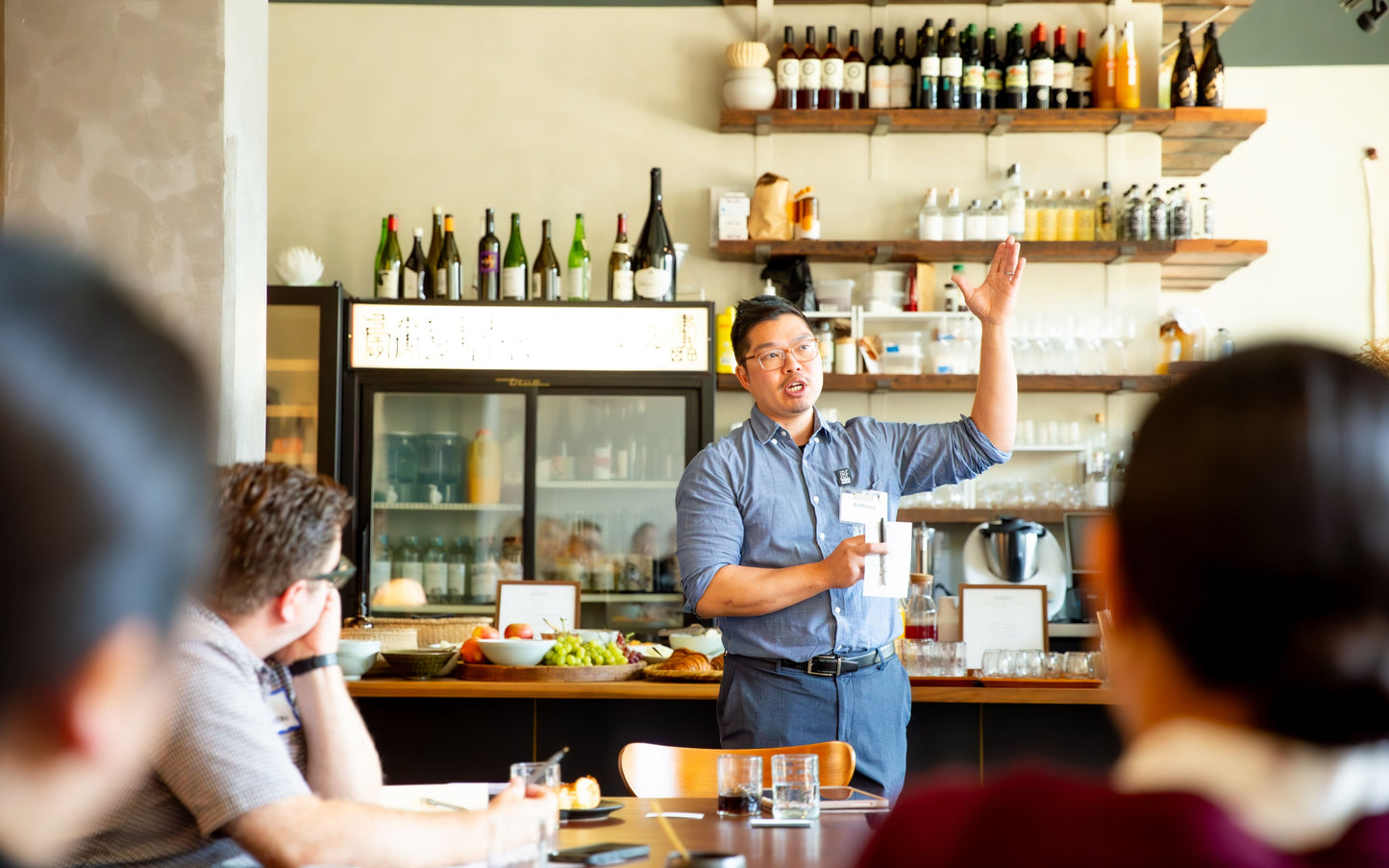
Pasta People is a Q&A series featuring cool humans doing great things.
First in the hot seat: Anthony Myint, the Executive Director of Zero Foodprint. Anthony works to mobilize the restaurant industry and its allies to support healthy soil as a solution to the climate crisis.
A celebrated chef known for co-founding Mission Street Food and The Perennial in San Francisco, Anthony initially introduced our Flour + Water team to Zero Foodprint in 2015 when he was our neighbor in the Mission. He completely changed our worldview as chefs, and from the get, we were all-in on the regenerative agriculture movement as a founding ZFP member. We realized that while sourcing organically and directly from trusted purveyors was a step in the right direction, true sustainability meant taking care of the land for future generations.
Anthony digs into ZFP’s origins + why regenerative agriculture is the most optimistic story in food in the fast five Q&A below.
For extra credit, check out his recent TED Talk: The recipe for a healthy climate starts at the dinner table.
What inspired you to start Zero Foodprint?
In general, my interest in giving back came from my father who was always trying to feed the community in various ways. During my years working as a fine dining line cook, often in open kitchens, the excess of that culture was front and center, and I wondered why successful businesses couldn't do more for the community or the planet. Chefs and restaurants are always generously hosting a fundraising event or giving a portion to a local elementary school, etc., but it's typically a one-off. Why not have a give-back model ingrained in the business?
When I started doing pop-ups and, subsequently, opened Mission Chinese Food, I insisted that each operate as social enterprises, where every pop-up or every entree functioned like a fundraiser. It was so much more meaningful. After a crazy night when everyone ran around for 5 hours, at least we knew a tangible amount was going to, say, the Food Bank and those who needed nourishment the most.
After I became a father, I started thinking about the future, and I felt drawn to finding a way for restaurants to be part of the climate solution. Zero Foodprint began to take shape. At the time, Mission Chinese Food was receiving accolades and international attention, and while attending the MAD Symposium with Rene Redzepi and other culinary luminaries, it fully clicked. I strongly believed that the cultural capital of chefs could drive a movement if the right mechanism was in place.
Conversations around climate change can feel overwhelming. What’s one thing you wish everyone knew about the regenerative agriculture movement?
Around 2014 I started learning about regenerative agriculture and basically went all-in. I think it's the biggest and most optimistic story in food. If we shift from farming against nature to farming with nature, we can turn back the clock on climate and remove as much as half of the excess carbon in the atmosphere. And it would result in more nutritious and delicious food and resilient and prosperous farms and communities. That kind of really big change will depend on society changing how millions of acres are managed. I think it's as inevitable and probably even more beneficial than the shift to renewable energy that's underway.
But the thing that people haven't understood yet, and that I wish everyone knew, is that we can all accelerate the change directly by just teaming up with farmers and ranchers to use the next dollar for the next regenerative practice on the next acre. So, in 2020 or so, Zero Foodprint became the mechanism – a way to directly change how food is grown. Now 80 leading businesses, like Flour + Water, are early adopters in a Table to Farm movement that's already generated $2.6 million for over 150 farm projects with as much GHG benefit as not burning 11 million gallons of gas – and we're just getting started.
Walk us through your “Shift Notes.” What’s a day-in-the-life like for you?
Gosh, these days I wake up at 6am or so and check the news in the regenerative and natural climate solutions movements and then am basically emailing, on Zooms or doing work on a computer all day. I started cooking to not talk to people and now I'm probably in 20 or 30 meetings a week, often directly with a policymaker or company decision-maker to discuss one-on-one how they can take action and regenerate in their specific supply chain or community.
What album is playing while you’re in the kitchen cooking?
I started listening to Mac Dre and Shannon and the Clams on Spotify before the pandemic as host/busser at Mission Chinese Food in SF, and I haven't stopped. But, if we're talking about an album, then maybe Sam Cooke - Live at the Harlem Square Club, or The Kleptones - Yoshimi Battles the Hip Hop Robots.
What’s your go-to pasta recipe?
These days I'm mostly cooking at home, and my daughter is 12, so we have a long-standing house recipe that is comprised of something like Flour + Water Campanelle pasta in "Awesome Sauce," which is some mix of melted leek brunoise, reduced stock/fish sauce, cream, tonkatsu ramen powder and an egg yolk. To this we each add our preferred accompaniments of the day, like blistered cherry tomatoes, roasted mushrooms, fennel confit, tiny seared meatballs, leftover spinach, herbs, chili crisp, you name it.
